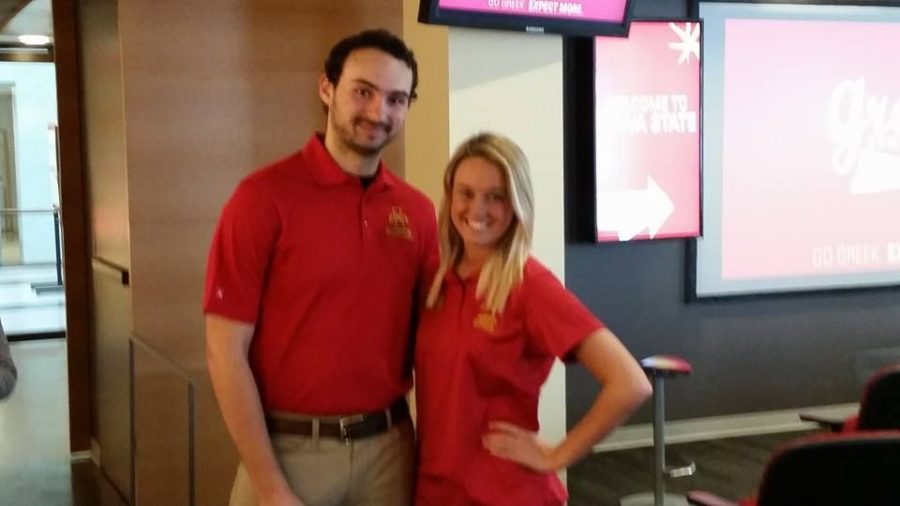Greek Ambassador program gives new students chance to learn about system
Courtesy of Greek Affairs Office
Two new greek ambassadors pose for a photo. Greek ambassadors serve to recruit new students into the greek community at Iowa State.
February 27, 2015
Prospective students visiting campus get to visit classrooms, dorms and dining centers. Now, thanks to the Greek Community Ambassador program, they have a chance to ask questions about the greek community.
“Over the past few years, our community has really grown, as has Iowa State,” said Katy Cran, assistant director of Greek Affairs. “As juniors and seniors in high school, they’re coming to campus, but they are also showing interest in going greek. We would like to provide that experience to all students that are coming to campus.”
Working with the Office of Admissions, Greek Affairs based their ambassadors off of the Student Admissions Representative, or STARS, program. The ambassadors will be speaking one-on-one with students during their visit, if they choose, and answering any questions they or their family may have about the greek community.
“[Admissions] sees that the peer-to-peer connection is really important for recruiting for Iowa State,” Cran said. “We wanted to use our students here on campus to work with prospective students, to help them not only recruit to Iowa State, but become a member of the greek community.”
Greek Affairs had more than 100 students apply for the position and 50 were interviewed before the top 25 were selected for the ambassador positions. The ambassadors have already undergone training and will begin tours March 2.
“I wanted to be a part of the ambassadors program because I really have appreciated my experience in the greek community,” said Stephanie Cox, senior in marketing. “I would love to share that with other incoming students and why I think the greek community is so great.”
Candidates are required to have a 2.75 grade point average at the time of appointment and the duration of leadership, good speaking skills, approachability, knowledge of Iowa State and the greek community and the ability to engage in conversation and handle uncertain situations well.
There were group and individual interviews. The group interview set up possible situations that might happen during a one-on-one time with prospective students and their family. One scenario included parents who were hesitant about their children participating in the greek community.
The candidates were able to discuss solutions and ways to approach the conversation. Individual interviews were an opportunity for candidates to elaborate on their applications.
“[During training] we had a representative from each of the counsels — Collegiate Panhellenic Council, Interfraternity Council, Multicultural Greek Council and National Pan-Hellenic Council — come present to us about their councils because some of us aren’t as familiar with councils that are not our own,” Cox said. “That way we [are] not excluding other councils in the way we are talking and presenting the greek community.”
The amount of students involved in the greek community make up 14.6 percent of the undergraduate student body, according to Greek Affairs fall 2014 recruitment records. Of the 4,049 freshman males, 683 joined a fraternity. As for the 2,944 freshman women, 638 took part in formal recruitment, but 797 joined the greek community.
“A vast majority of those women were new members of Alpha Phi, our newest organization,” Cran said. “They didn’t participate in formal recruitment but did their process afterwards, so we include them as new members. They recruited a whole chapter full of women.”

















